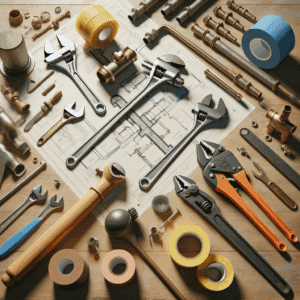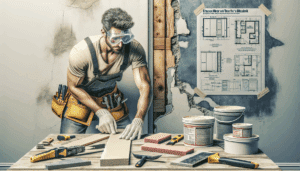Electricity is an essential part of modern homes, powering everything from lights and appliances to heating and cooling systems. Without electricity, our daily lives would be significantly impacted. Electrical work involves the installation, repair, and maintenance of electrical systems in homes. It is crucial to ensure that your home’s electrical system is safe and functioning properly to avoid potential hazards such as electrical shocks, fires, and damage to appliances.
Key Takeaways
- Electrical work is important for the safety and functionality of your home.
- Understanding basic wiring and safety precautions can prevent accidents and damage.
- Common electrical problems can often be fixed by a handyman.
- Hiring a handyman for electrical work can save time and ensure quality.
- DIY electrical work requires proper tools, equipment, and knowledge.
Understanding the Basics of Electrical Wiring and Safety Precautions
Electrical wiring refers to the system of conductors, cables, and devices that carry electricity throughout your home. There are different types of electrical wiring, including knob-and-tube wiring, aluminum wiring, and copper wiring. Each type has its own advantages and disadvantages, and it is important to understand the type of wiring in your home.
When working with electricity, safety precautions are of utmost importance. Always turn off the power before working on any electrical circuit or device. Use insulated tools and wear protective gear such as gloves and goggles to prevent electrical shocks. It is also essential to follow local building codes and regulations when performing electrical work.
Common Electrical Problems in Homes and How to Fix Them
Common electrical problems in homes include flickering lights, tripping circuit breakers, outlets not working, and electrical shocks. These issues can be caused by various factors such as faulty wiring, overloaded circuits, or damaged appliances.
For flickering lights, check if the light bulb is loose or needs replacement. If the problem persists, it could be due to a loose connection in the wiring or a faulty switch. Tripping circuit breakers can be caused by overloaded circuits or a short circuit. To fix this issue, unplug any unnecessary appliances or redistribute the load on different circuits.
If outlets are not working, check if the circuit breaker has tripped or if there is a GFCI (Ground Fault Circuit Interrupter) outlet that needs to be reset. If these solutions do not work, it may be necessary to replace the outlet or check for wiring issues. Electrical shocks can be caused by faulty wiring or damaged appliances. In such cases, it is best to consult a professional electrician to ensure safety.
Benefits of Hiring a Handyman for Your Electrical Needs
| Benefits of Hiring a Handyman for Your Electrical Needs |
|---|
| 1. Safety: A professional handyman has the knowledge and experience to handle electrical work safely. |
| 2. Time-saving: Hiring a handyman can save you time and effort, as they can quickly diagnose and fix electrical issues. |
| 3. Cost-effective: A handyman can help you save money by preventing costly mistakes and ensuring that the job is done right the first time. |
| 4. Expertise: A handyman has the expertise to handle a wide range of electrical issues, from simple repairs to complex installations. |
| 5. Peace of mind: Hiring a professional handyman can give you peace of mind, knowing that your electrical work is in good hands. |
Hiring a handyman for your electrical needs can have several advantages. Firstly, a handyman is trained and experienced in handling electrical work, ensuring that the job is done safely and efficiently. They have the knowledge and skills to troubleshoot electrical problems and provide appropriate solutions.
Additionally, hiring a handyman can be cost-effective. They often charge lower rates compared to specialized electricians, making it more affordable for homeowners. A handyman can also handle multiple tasks in one visit, saving you time and money.
How to Choose the Right Handyman for Your Electrical Work
When choosing a handyman for your electrical work, there are several factors to consider. Firstly, ensure that the handyman is licensed and insured. This provides protection in case of any accidents or damages during the job. It is also important to check their experience and qualifications in electrical work.
Before hiring a handyman, ask for references or read reviews from previous clients. This will give you an idea of their reputation and the quality of their work. Additionally, ask about their pricing structure and get a detailed estimate for the job to avoid any surprises.
Tools and Equipment Needed for Electrical Work
To perform electrical work, certain tools and equipment are necessary. Some essential tools include wire strippers, pliers, screwdrivers, voltage testers, and wire cutters. These tools are used for tasks such as stripping wires, tightening connections, and testing voltage levels.
Safety gear is also crucial when working with electricity. This includes insulated gloves, safety glasses, and non-conductive footwear. These protective measures help prevent electrical shocks and other accidents.
Step-by-Step Guide to DIY Electrical Work for Beginners
If you are comfortable with basic electrical work, there are certain steps you can follow for DIY projects. Firstly, turn off the power to the circuit you will be working on by switching off the corresponding circuit breaker. Use a voltage tester to ensure that the power is indeed off.
Next, remove the cover plate from the outlet or switch you will be working on. Carefully disconnect the wires, making note of their positions. If necessary, strip the ends of the wires to expose the bare copper.
Install the new outlet or switch by connecting the wires in the same positions as before. Secure the device in place and replace the cover plate. Finally, turn on the power and test the device to ensure it is working properly.
Tips for Maintaining Your Home’s Electrical System
Maintaining your home’s electrical system is essential for safety and efficiency. Regularly inspect your electrical panel for any signs of damage or overheating. Check outlets and switches for loose connections or signs of wear and tear.
Keep your electrical system clean by removing dust and debris from outlets and switches. Avoid overloading circuits by distributing the load across different circuits. If you notice any issues or abnormalities, such as flickering lights or tripping breakers, consult a professional electrician for further inspection.
Upgrading Your Home’s Electrical System: When and Why You Need It
There are several signs that indicate your home’s electrical system may need an upgrade. If your home has outdated wiring such as knob-and-tube or aluminum wiring, it is recommended to upgrade to safer and more efficient copper wiring.
If you are planning to add new appliances or make significant renovations to your home, an electrical system upgrade may be necessary to handle the increased load. Additionally, if you frequently experience tripping breakers or flickering lights, it could be a sign of an overloaded electrical system that needs upgrading.
Upgrading your home’s electrical system has several benefits. It improves safety by reducing the risk of electrical hazards such as fires and shocks. It also increases the capacity of your electrical system, allowing you to use more appliances and devices without overloading the circuits.
Frequently Asked Questions About Electrical Work and Handyman Services
1. Can I do my own electrical work?
While some basic electrical tasks can be done by homeowners, it is generally recommended to hire a professional for more complex jobs. Electrical work can be dangerous if not done correctly, and it is important to prioritize safety.
2. How much does it cost to hire a handyman for electrical work?
The cost of hiring a handyman for electrical work can vary depending on factors such as the complexity of the job and the location. It is best to get multiple quotes from different handymen to compare prices.
3. How often should I have my home’s electrical system inspected?
It is recommended to have your home’s electrical system inspected by a professional electrician every 3-5 years. This helps identify any potential issues and ensures that your electrical system is safe and up to code.
4. What should I do if I experience an electrical emergency?
In case of an electrical emergency such as a fire or severe electrical shock, immediately call emergency services and evacuate the premises. Do not attempt to handle the situation yourself, as it can be extremely dangerous.
In conclusion, electrical work is an important aspect of maintaining a safe and functional home. Understanding the basics of electrical wiring and taking necessary safety precautions are crucial when working with electricity. Common electrical problems can often be fixed with DIY solutions, but hiring a handyman for more complex tasks is recommended. Regular maintenance and upgrades are necessary to ensure the safety and efficiency of your home’s electrical system. By following these guidelines and seeking professional help when needed, you can ensure a safe and reliable electrical system in your home.
If you’re in need of electrical work, it’s important to hire a professional handyman who specializes in this area. DIY electrical work can be dangerous and may lead to serious consequences if not done correctly. In an article titled “The Shocking Truth About DIY Electrical Work and the Importance of Professional Handymen,” East Valley Handyman discusses the risks involved in attempting electrical repairs on your own and emphasizes the importance of hiring a skilled and experienced handyman for such tasks. To learn more about the dangers of DIY electrical work and why it’s crucial to rely on professionals, check out the article here.




